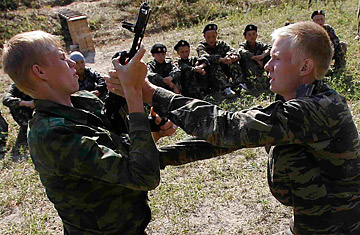
Teenagers undergo training at a military boot camp, run by local Cossack organisations and set up in the mountains of Crimea near the town of Bakhchisarai, Ukraine, August 4, 2011.
(2 of 2)
By noon the next day, about a hundred angry Cossacks had descended on the scene from all over the Crimea. After waiting for the press to arrive, they picked up the crucifix, complete with its Byzantine depiction of Christ, and used it as a battering ram to charge the line of riot police who were guarding the spot where it had stood. In the ensuing brawl, more than a dozen Cossacks were beaten with truncheons, several had to be hospitalized, but their goal had been achieved: the Ukrainian police had come off as brutes and apostates in the eyes of many in the Russian Orthodox community.
"These actions send an effective message, and we will continue them," said Vitaly Khramov, one of Ukraine's most prominent Cossack elders. "We want them to understand that the state of Ukraine is a stillborn project, a tumor that Ukrainians must extract from themselves ... We are the immunity against this disease." As the head of Sobol, the radical Cossack battalion whose flags adorned the training camp last week, Khramov is one of the movement's key ideologues in Ukraine, and his preaching has reached many of the boys who attend the Cossack camps. (Among the ideas he spouted during his interview with TIME were the notions that the U.S. is a satanic nation secretly run by the Rockefeller family, that Jews practice ritual sacrifice and necrophilia, and that Vladimir Putin, Khramov's political hero, is a future saint of the Russian Orthodox Church.)
He said several times that the "Khramov brand," which he meant his reputation and ideology, had been developed by powerful people in Moscow's political circles. ("I am only a pawn in a much bigger game," he said.) But it is impossible to know how much of this is braggadocio. The Ukrainian secret service, however, has chosen to err on the side of caution: it has been seeking to deport Khramov, a Russian citizen, back to his motherland since last year after he was convicted and fined for inciting ethnic hatred. Khramov is appealing that verdict. (Among the other charges investigators have considered filing against him is polygamy, to which Khramov readily admits. Standing more than 2 m tall with hands the size of dinner plates, he says he has fathered 16 children by five wives, all of them common law.)
At his most recent court hearing on Aug. 9 in the Crimean capital of Simferopol, a small contingent of uniformed Cossacks demonstrated outside the court house. Along with several dozen policemen who stood guard around them, a secret-service agent from the counterextremism squad was on hand to videotape Khramov's supporters. "I wouldn't call them an imminent threat, more like a nuisance," the agent told TIME, only giving his first name, Andrei. "So far the Cossacks can't get more than a few hundred people out on the streets to protest." Asked if he knew where their funding was coming from, Andrei said it was unlikely to be the Russian Orthodox Church, which he said is too venerable an institution to get involved with "hooligans." Much more likely, he said, "the money is coming from the Cossacks in Russia."
With one degree of separation, that trail could lead back to Moscow's political institutions, which have given the Cossacks official status and provided generous state support. The Kremlin has a department devoted to Cossack relations, and in 2005, Putin signed the federal law called On the State Service of the Russian Cossacks, which establishes special Cossack units in Russia's security forces, granting them various rights normally monopolized by the state, like the right to police Russian territory and provide military training. All such services, the law states, are to be financed by the government. There is of course no such law in Ukraine, where Cossack groups have the legal status of nongovernmental organizations.
But in recent years, the Cossacks have begun actively campaigning for and winning seats in Ukraine's political bodies, primarily local legislatures in the Crimea and the pro-Russian heartland of eastern Ukraine. In Russia, there are already numerous Cossacks in senior positions of government, like the powerful Kremlin envoy to the North Caucasus Federal District, Alexander Khloponin, who was initiated into the Terek Cossack legion during an extravagant ceremony last October. Aside from being a member of the State Duma, Vodolatsky chairs a committee in the union parliament of Russia and Belarus. In his interview with TIME, he said that was where millions of dollars in financing had come from for the recruitment and training of Cossacks in the two countries. He declined to say whether any of that money was used for training in Ukraine. Yurchenko, his envoy in the Crimea, denied that his training camp received any foreign funding.
But regardless of who might be financing the camp, it does provide the young boys with ample lessons in pro-Russian ideology, as well as putting some of them through a brutal initiation rite that Vodolatsky defended as a necessary step toward "making them men." Conducted either by a martial-arts instructor or one of the older cadets, the test involves a three-minute beating that leaves the boys bruised and bloodied. "It was totally worth it," said Kiril, a 15-year-old Ukrainian who also said he passed the initiation to receive his Cossack cadet's beret. "I felt like I'd been born again after that." In a few years, when he came of age, he said he planned to join the Ukrainian army. But he seemed not to have given much thought to the question of his loyalties. Whose orders would he obey first? Those of his Cossack commander or his Ukrainian ranking officer? "I don't know. Both, I guess." He looked around at several of the other boys, who stared down into their lunch of potato soup. "Is that possible?"
